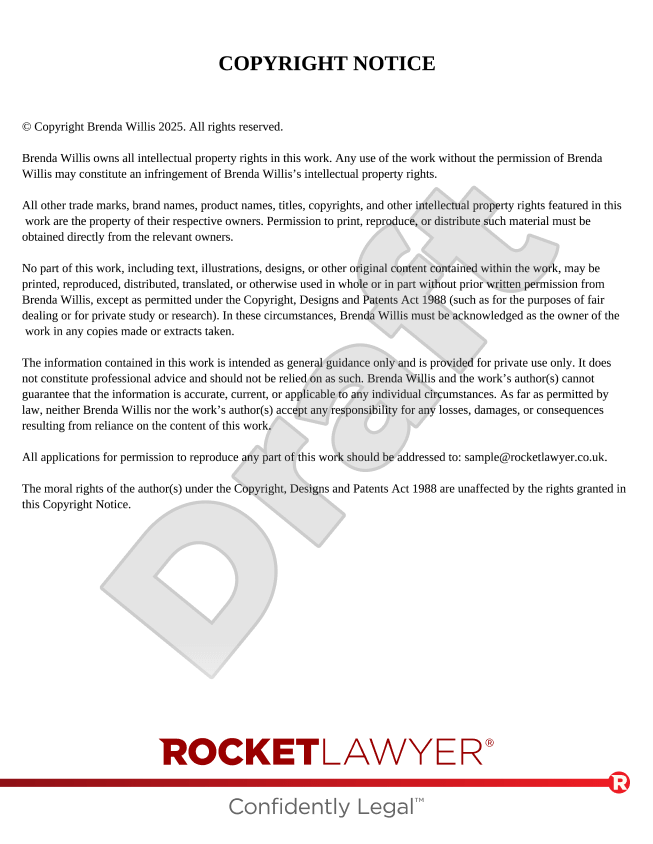What is copyright?
Under the Copyright, Designs and Patents Act 1988, copyright is a protection for authors and creators of tangible creative works including:
-
literary works (like novels, song lyrics, plays, newspapers and computer programs)
-
artistic works (like drawings, paintings, sculptures and photographs)
-
musical compositions, sound recordings, films and broadcasts
-
databases
-
maps, architectural designs and technical drawings
How does copyright arise?
Copyright arises automatically. There is no need to register it and there is no process for official registration.
As soon as an idea is written down or recorded in some other tangible form, copyright protection applies automatically without any need to register it.
Who owns copyright?
Usually, the owner is the author or creator of the work or the person who made the arrangements for, say, a sound recording or a film to be made.
There are two important exceptions to this.
Works made by employees
Any works made by employees will be owned by the employer, unless something else is agreed in the Employment contract. These types of works are usually referred to as ‘works created in the course of employment’.
Commissioned work
When you ask someone to create a copyrighted work for you (eg you ask a photographer to take your wedding photos), then the copyright owner is the creator of the work, not the commissioner, unless the creator and commissioner agree otherwise in writing.
Can copyright be transferred?
The original copyright holder can transfer their copyright to another party. They can either:
-
licence their copyright - this involves allowing others to use the copyrighted work in exchange for payments. For more information, read Intellectual property licensing
-
sell or transfer their copyright - this involves an ‘assignment’ of the copyright to another party (either in return for a payment, eg when the copyright is sold, or for free, eg as a gift or through a Will)
What does copyright do?
Copyright grants certain economic and moral rights.
The economic rights grant copyright owners the right to make commercial gains from their works (this is known as ‘exploiting IP’). They stop others from copying or adapting your works, or making them available to others (eg selling or renting copies or your works to the public or performing or showing your works in public), without your permission.
If an identical work is created independently by someone else it can be used provided it was not copied from yours. There are limited exceptions when others can copy your work (eg for research purposes or a review).
The moral rights protect the emotional and/or intellectual importance of the work and include the right to be recognised as the author of a work. For more information, read Moral rights for copyright.
How long does copyright last?
The length of copyright protection depends on the type of work. For:
-
artistic, musical, dramatic and literary works the copyright lasts for 70 years after the death of the author
-
sound and music recordings the copyright lasts for 50 years from the date it was made. If while protected by copyright the recording is published or otherwise made available to the public (eg by being played in public) copyright lasts for 70 years from the date it was first made available to the public
-
broadcasts the copyright lasts for 50 years from the date it was first broadcasted
-
films the copyright lasts for 70 years after the death of the last to die out of the film’s director, screenwriter, dialogue author and composer
For more information, see the Government’s guidance.
How can I protect my copyright?
Copyright is applied to all original works automatically, so you don't even need to mark it on your work.
Whilst there is no official registration, you should take steps to protect your copyright by providing evidence that you had the work at a particular time, for example by depositing a copy with a bank or a solicitor.
A number of private companies operate unofficial registers, but check exactly what you are getting for your money before going down this route.
When you publish copyright material (either in paper form or online) mark it with the international copyright symbol - © - followed by the name of the copyright owner and the year of creation. This is the language you will always see on the front pages of a book.
When you share your valuable confidential information, including copyright, with another business, you can consider using an appropriate confidentiality agreement (also known as a non-disclosure agreement or NDA). Depending on whether one or both parties are sharing confidential information, you can make either a mutual Non-disclosure agreement or One-way confidentiality agreement.
Make sure your agreements with independent consultants have the necessary provisions relating to IP created in the course of working for you. Rocket Lawyer’s Consultancy agreement sets out that any IP created by a consultant is owned by the client who engaged the consultant.
If a party breaches your copyright, consider sending a Cease and desist letter for IP infringement or otherwise coming to an agreement to protect your intellectual property. For more information, read Remedies for intellectual property right infringement.
For specific overseas copyright and IP information, see the Government’s guidance.
Exceptions to copyright
While anyone who wishes to use copyrighted work must generally seek the permission of the copyright owner, there are certain circumstances when this is not the case. These circumstances are known as ‘exceptions to copyright’. For more information, read Exceptions to copyright.




